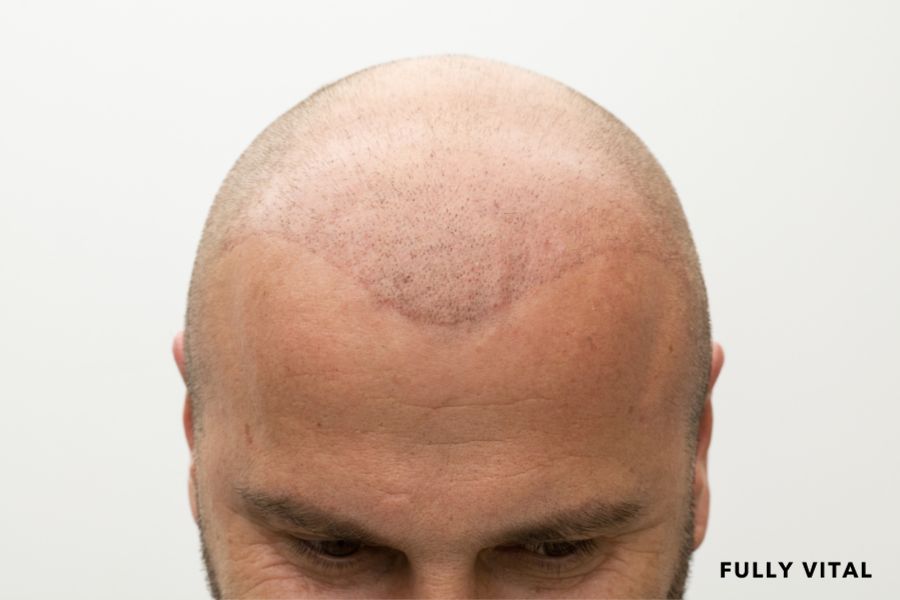
Hair Cloning: Unlocking The Secrets To Gorgeous Locks
Welcome to our comprehensive guide on hair cloning, the cutting-edge solution for women of all hair types seeking to stimulate hair growth. In this conversational article, we will delve into the world of hair cloning, addressing key questions and concerns to provide you with all the information you need. Let's get started!

I LOVE MY HAIR NOW
FullyVital hair serum and hair vitamins made tremendous improvements in my hair. I truly love my hair now.
Dorit S.,
What Is Hair Cloning?
Hair cloning, a revolutionary advancement in the field of hair restoration, holds the promise of regenerating hair follicles to combat hair loss. Unlike traditional hair transplant methods, hair cloning aims to create an abundant supply of hair follicles from a small sample, offering a more sustainable and effective solution.

Why Is Hair Cloning Important?
Hair cloning is of paramount importance to individuals experiencing hair loss or thinning hair. It offers a potential long-term solution that can restore not only your hair but also your confidence and self-esteem. This groundbreaking technology addresses the root cause of hair loss, ensuring lasting results.
How Does Hair Cloning Work?
Hair cloning operates on the principle of replicating hair follicles through the use of advanced cellular therapies.(1) Here's a simplified breakdown of the process:
Sample Collection (Hair Follicle Extraction)
A small sample of healthy hair follicles is extracted from the patient's scalp.
Cell Cultivation
The collected follicles are cultured and multiplied in a laboratory setting.
Follicle Implantation
The multiplied hair follicles are implanted back into the patient's scalp, promoting natural hair growth.
This innovative procedure offers a promising solution for those looking to rejuvenate their hair.
What Are The Benefits Of Hair Cloning?
Embracing hair cloning comes with a host of advantages:
- Natural-Looking Results: Hair cloning provides results that look and feel completely natural, blending seamlessly with your existing hair.
- Minimal Scarring: Unlike traditional hair transplants, hair cloning minimizes scarring, ensuring a discreet and undetectable procedure.
- Long-Lasting: With proper care, the results of hair cloning can last a lifetime, reducing the need for repeat treatments.
- Versatility: Hair cloning is suitable for various hair types and can address a wide range of hair loss conditions.
Are There Any Downsides To Hair Cloning?
While hair cloning shows immense promise, it's essential to consider potential drawbacks:
- Cost: The procedure can be expensive, making it inaccessible to some individuals.
- Research Stage: Hair cloning is still in the research and development phase, with limited availability.
- Not a Quick Fix: Results may take some time to become noticeable, requiring patience.
What Are The Alternatives To Hair Cloning?
If you're exploring alternatives to hair cloning, here are some options to consider:
Topical Treatments
Products like minoxidil and finasteride can help stimulate hair growth when applied regularly.
Hair Transplants
Traditional hair transplant procedures involve the relocation of existing hair follicles to thinning areas.
Low-Level Laser Therapy (LLLT)
LLLT devices use low-level laser light to stimulate hair follicles and promote growth.(2)
Diet and Lifestyle Changes
A balanced diet, stress management, and a healthy lifestyle can positively impact hair growth.
Wigs and Hairpieces
Non-surgical options like wigs and hairpieces provide immediate cosmetic solutions.
Is Hair Cloning Possible Yet?
Hair cloning, the much-anticipated solution for hair loss, remains in the experimental stage and is not widely available to the public. Here's what you need to know:
- Ongoing Research: Scientists and researchers are actively studying and refining the hair cloning process, but it has not yet reached a point where it can be considered a standard treatment.(3)
- Limited Availability: Hair cloning procedures are currently limited and may only be accessible in specialized clinics and research settings.
- Consultation Is Key: If you're interested in hair cloning, consult with a qualified healthcare professional to explore the latest developments and your eligibility.
Why Is Hair Cloning So Hard?
Hair cloning presents unique challenges that make it a complex and intricate procedure. Here are some reasons why:
Cellular Complexity
Hair follicles are intricate structures with various cell types, making it challenging to replicate them accurately.
Precise Growth Environment
Creating the optimal environment for hair follicles to grow outside of the body is a delicate process that requires precise conditions.
Regulatory Hurdles
Hair cloning involves manipulating human cells and tissues, which brings about regulatory and ethical considerations that need to be carefully navigated.
Is There Enough DNA In Hair To Clone?
Hair contains genetic information, but the amount of DNA present is limited. Here's what you should know:
- Trace Amounts of DNA: Hair follicles do contain DNA, but the quantity is minimal compared to other tissues like blood or saliva.
- Challenges in Cloning: The scarcity of DNA in hair follicles poses challenges for cloning, as a sufficient amount of genetic material is necessary for successful replication.
- Supplementing DNA: In some cases, researchers may need to supplement the DNA extracted from hair follicles to facilitate cloning.
Is Hair Cloning Successful?
The success of hair cloning can vary from person to person and depends on several factors:
- Research and Development: Hair cloning is still undergoing research and development, and its success rates may improve as the technology advances.(4)
- Patient-Specific Factors: The effectiveness of hair cloning can be influenced by individual factors such as the extent of hair loss, overall health, and adherence to post-procedure care.
- Consultation and Evaluation: Consulting with a qualified healthcare provider can help determine the potential success of hair cloning in your specific case.
Is Hair Cloning An Effective Treatment?
The effectiveness of hair cloning as a treatment option is a topic of ongoing research and debate. Here's a breakdown of key considerations:
- Variable Results: Hair cloning's effectiveness can vary, and not all individuals may experience the same results.
- Promising Potential: While not yet widely available, hair cloning shows promising potential for providing long-lasting and natural-looking results.
- Complementary Treatments: Combining hair cloning with other hair restoration methods may enhance its effectiveness. Consultation with a healthcare provider is essential to determine the best approach for your unique needs.
Unlock The Secret To Youthful Hair With Fully VitalExperience the transformation your locks deserve with Fully Vital's science-backed hair growth products. Discover the benefits:
Choose Fully Vital for a healthier relationship with your locks. |
Final Thoughts On Hair Cloning
The world of hair cloning holds immense promise for those seeking effective solutions to combat hair loss and rejuvenate their locks. While it's still in the research and development phase, the potential benefits are undeniable. As you embark on your journey to healthier, more vibrant hair, remember that there are various options available.
At Fully Vital, we understand the importance of maintaining a healthy relationship with your hair. Our range of hair growth products is designed to combat the signs of aging, promoting strong, beautiful locks. Whether you're exploring cutting-edge techniques like hair cloning or seeking everyday solutions, our products can complement your journey towards healthier hair.
As you continue to explore the world of hair restoration, we encourage you to stay informed, consult with healthcare professionals, and make choices that align with your unique needs and goals. Your locks deserve the best, and at Fully Vital, we're here to support you every step of the way.
Frequently Asked Questions About Hair Cloning
Can hair cloning address hair thinning or partial baldness?
Hair cloning is not limited to addressing complete baldness. It can also be used to treat hair thinning and partial baldness by stimulating the growth of existing hair follicles and enhancing overall hair density. The suitability of hair cloning for your specific condition can be determined through consultation with a healthcare professional.
Is hair cloning available for everyone?
Hair cloning is still in the experimental stage and may not be readily available to the general public. It's essential to consult with a qualified medical professional to determine eligibility.
Are there any risks associated with hair cloning?
As with any medical procedure, there may be potential risks and side effects. These can vary from person to person, so it's crucial to discuss them with your healthcare provider.
How long does it take to see results from hair cloning?
Results from hair cloning may take several months to become noticeable. Patience and consistent aftercare are key to achieving the best outcomes.
Can hair cloning be combined with other hair restoration methods?
Combining hair cloning with other treatments may be possible and can provide enhanced results. Consult with your healthcare provider to explore your options.
Is hair cloning a permanent solution?
With proper care and maintenance, hair cloning has the potential to offer long-lasting results, making it a semi-permanent solution for hair loss.
What is the cost of hair cloning?
The cost of hair cloning can vary significantly based on factors such as the extent of hair loss and the clinic's location. It's advisable to obtain quotes from reputable providers.
Are there any side effects or risks associated with hair cloning?
As with any medical procedure, there may be potential risks and side effects associated with hair cloning. These can include infection, scarring, and variations in the success of the procedure. It's crucial to discuss these risks with your healthcare provider and make an informed decision based on your individual circumstances.
How can I stay informed about the latest developments in hair cloning?
To stay updated on the latest developments in hair cloning and potential treatment options, consider following reputable medical news sources, consulting with healthcare professionals, and participating in discussions within online communities dedicated to hair restoration and regrowth.
What is the current status of hair cloning research?
As of now, hair cloning is still in the research and development phase. While promising advancements have been made, it is not yet widely available as a standard treatment option. Researchers continue to work on refining the procedure and addressing its challenges.
Sources:
- Teumer, J., & Cooley, J. (2005). Follicular Cell Implantation: An Emerging Cell Therapy for Hair Loss. Seminars in Plastic Surgery, 19(02), 193–200. https://doi.org/10.1055/s-2005-871735
- Avci, P., Gupta, G. K., Clark, J., Wikonkal, N., & Hamblin, M. R. (2013). Low-level laser (light) therapy (LLLT) for treatment of hair loss. Lasers in Surgery and Medicine, 46(2), 144–151. https://doi.org/10.1002/lsm.22170
- Bernstein Medical - Center for Hair Restoration. (2009, July 30). Www.bernsteinmedical.com. https://www.bernsteinmedical.com/medical-treatment/hair-cloning/research/
- Stenn, K., Parimoo, S., Zheng, Y., Barrows, T., Boucher, M., & Washenik, K. (2007). Bioengineering the Hair Follicle. Organogenesis, 3(1), 6. https://doi.org/10.4161/org.3.1.3237






